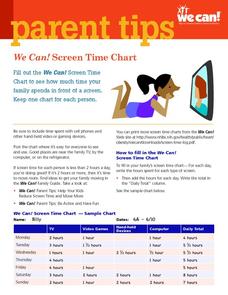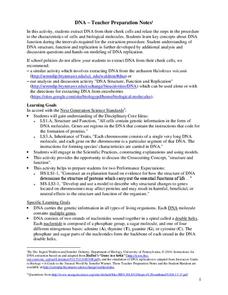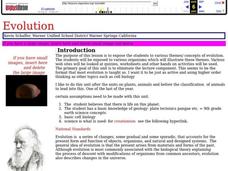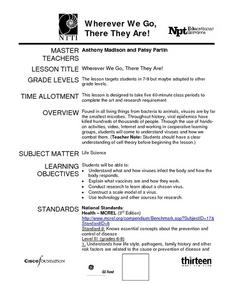Curated OER
What Happens When A Cell Divides?
Students investigate the cycle of mitosis. In this biology lesson plan, students discuss the different stages of mitosis through cell reproduction. They further their investigation through laboratory analysis.
Teach Engineering
How Antibiotics Work
Take two pills and call me in the morning. The first lesson in a short unit of four introduces class members to delivery methods of medicines. The instruction introduces the question of which delivery method is best to get you feeling...
LABScI
Botany: The Plant Dissection Lab
Study everything about plants! The 12-part series of lessons continues with an examination of many aspects of plants. Components of the laboratory activity address the growth and structure of plants by evaluating familiar plants. The...
iCivics
Why Do We Have a House and Senate, Anyway?
Why does the United States have a bicameral voting system? Through role playing as either advocates for or against a cell phone policy in school, your learners will organize, vote, compromise, and experience first-hand the benefits of a...
We Can!
We Can! Screen Time Chart
Screens are everywhere these days, from televisions and video games to cell phones and computers. Raise awareness of excessive screen time by helping your learners track how much time they each accumulate on a daily basis looking at...
Outdoor Learning Center
Outdoor Survival
Which of the following can you survive without for the longest time: water, food, or a positive mental attitude? The answer may surprise you. Guide learners of all ages through games, activities, and discussions about surviving in the...
Teach Engineering
The Temperature Effect
How temperature affects the efficiency of a solar panel is the focus of the third in a series of eight resources that presents how engineers are able to control the temperatures of photovoltaic panels. Class members find out how the...
NOAA
Prepare for the Storm!
Severe weather can occur with or without warning. Being prepared for any situation makes chances of survival that much greater. A brief activity suggests a list of items for an emergency book bag. The first page...
Baylor College
They're Everywhere: Bacteria
Totally gross out your class with the eighth lesson in this series on food science. Explore the microscopic world of bacteria by taking swabs of different classroom objects and growing colonies in petri dishes. An engaging activity that...
Exploratorium
Depth Spinner
Put a new twist on your collection of optical illusion activities. Affix the linked printable spiral to a drill, record player, or some other rotating tool. Have learners stare at the spinning disk for only 15 seconds and then look away....
Curated OER
Strawberry Smoothies
Biologists extract the DNA from a strawberry. After completing the procedure, learners write answers to a few questions on the lab sheet provided. This is ideal lab practice during a DNA unit in your general biology course.
American Physiological Society
An Inquiry into Alcoholic Fermentation
Introduce life science students to their new "best buds" yeast! Using a wide variety of materials, lab groups design an experiment that illustrates how yeast acquires the resources it needs to undergo cellular respiration. The teacher's...
Curated OER
How Do You Light Up Your World?
A fabulous presentation on light is here for you. In it, learners view slides which cover many important concepts of light. They understand exactly what light is, what the main sources of light are, what opaque, transparent, and...
Curated OER
How Do You Light Up Your World?
A tremendous presentation on the properties of light. Young scientists are treated to slides which share a lot of fascinating information about light. This impressive PowerPoint is filled with great photos, graphics, and discussion...
Curated OER
Dragon Genetics ~ Independent Assortment and Genetic Linkage
Imagine a pair of dragons that produce offspring. What percentage of the hatchlings have wings and large antlers? An engaging activity draws genetics learners in, introduces them to alleles, meiosis, phenotypes, genotypes, and...
Serendip
From Gene to Protein via Transcription and Translation
DNA carries the codes for creating just the right protein. A well-designed lesson leads pupils through the process from start to finish and everywhere in between. Guiding questions with supporting video help scholars understand the...
Curated OER
Extracting DNA from Your Cells - Teacher Preparation Notes
Students extract their own DNA from cheek cells. In this biology instructional activity, students explain the replication process. They identify the structure and composition of DNA.
Curated OER
How To Make Yeast Cells Thrive
Students set up and run the experiments they designed in the lesson, 'Population Growth in Yeasts,' using simple yeast-molasses cultures in test tubes. They demonstrate understanding that several environmental factors can contribute to...
Serendip
Is Yeast Alive?
Through two investigations, life science learners determine whether or not yeast is alive. They perform tests for metabolism by providing sugar and observing if gas is produced as a byproduct. They incubate some of the sample for at...
Curated OER
Evolution
Explore the concept of evolution and cell biology; your class can work in groups to use the internet to view websites on evolution, take a quiz, and complete a lab activity.
Teach Engineering
Making Model Microfluidic Devices Using JELL-O
Nothing flows like J-E-L-L-O! In the final portion of a four-part series, pupils create scale models of microfluidic devices out of gelatin and bendable straws. They use their devices to test various flow rates in the delivery of...
Teach Engineering
Common and Natural Logarithms and Solving Equations
Log some practice with logarithms. A PowerPoint presentation provides a tutorial on the change of base formula involving natural logarithms and solving exponential equations with logarithms in the fourth installment of a seven-part...
Curated OER
Wherever We Go, There They Are!
The central video for this lesson is not available through the included resource link. However, the activity that simulates the passing of a virus through a population is impacting and the other resource links are invaluable. Use this...
Curated OER
Solar Energy Connection
Students conduct solar experiments. They calculate the solar gain and operate a solar cell devise used to generate electricity. Students compare and contrast solar energy gain with students in India. They analyze the difference...

























